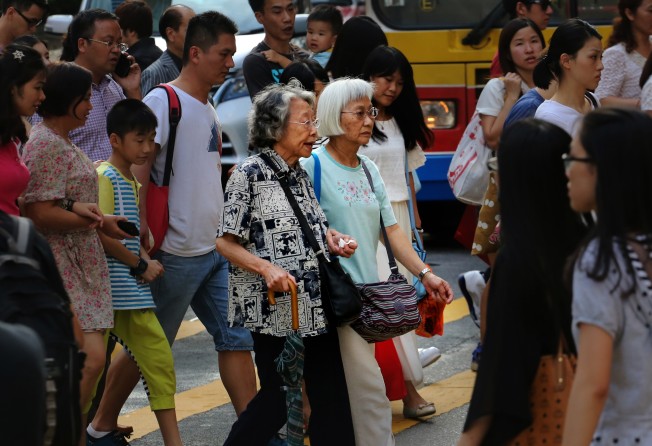
Hong Kong's population to decline after 2043, first 50-year projection indicates
First 50-year projection sheds further light on the challenges of an ageing population, as experts call for fresh approach to elderly care

Hong Kong's population will record a decline for the first time in the city's history after hitting a peak of 8.2 million in 2043, according to the first 50-year projection of the city's population.
The study, released yesterday by the Census and Statistics Department, also sheds light on the likely impact of the ageing population amid warnings from experts that the city is seriously underprepared for the severe demographic changes as post-war "baby boomers" retire.
By 2064, the study expects Hong Kong's population to have slid to 7.8 million, while the working population will be 500,000 lower than last year, a reduction of 14 per cent. Hong Kong had 7.2 million residents last year, of whom 3.6 million were working.
"The estimates aren't a huge surprise, but we just never notice some figures - so this time figures like the [over-85s] seem suddenly more prominent, and the problems bigger," said Professor Law Chi-kwong, a social work scholar at the University of Hong Kong. "Some services we basically haven't really developed - like dementia. Other care services, there's still some ways to go in order to catch up to the needs."
People aged 65 or over will make up 30 per cent of the population by 2034 - compared to 15 per cent last year - and increase to 36 per cent by 2064. In 2050, the number of people over 85 will cross 9 per cent, going up to 9.3 per cent in 2064 - compared to the 2.3 per cent this year.
Based on ratios today, that suggests more than half a million Hongkongers will suffer from dementia in a city that, as the Post has reported, badly lacks services for people with the condition. One in 10 people aged 65 to 79 and one in three people aged 80 and above have dementia.
"By then the problem of dementia will be everywhere. We, the social workers and hospitals, have known it for a while and have been preparing, but this will really let the rest of government know ... and the public," said Professor Alfred Chan Cheung-ming, chairman of the government's Elderly Commission.
HKU population expert Professor Paul Yip Siu-fai said for elderly people today, the choice of service was either "institutional care or you're fine". "This is very dichotomous," he said. "With this change in population, we need to figure out how to shift care from institutions to community. It's not just about fiscal support, but social support."
Life expectancy will also go up about five years - to 87 for men and 92-1/2 for women. It will also mean women outnumber men by three to two - which census commissioner Leslie Tang Wai-kong said reflected women's longer life expectancy and the fact most arrivals from the mainland were women.
Chan said the report would encourage academic research and pressure the government to make a decision on retirement protection, after years of debate on universal pensions or increased means-tested aid.
Law said a 50-year projection was in line with international standards. "This allows us to see that number of elderly people will stabilise in 2055 and to see what's after the peak. If we just deal with the high tide, it's not enough," Law said.